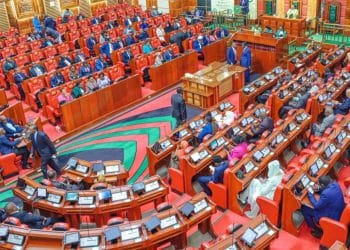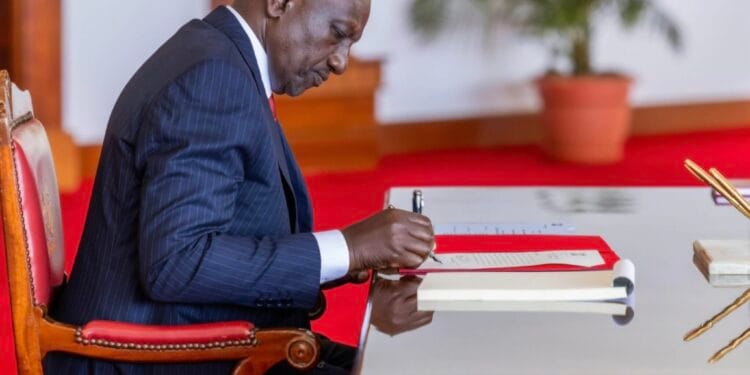President William Ruto has forwarded the John Cox Lorionokou nomination as Registrar of Political Parties to Parliament for approval, alongside the Agatha Wanjiku Wahome Assistant Registrar pick, in a move aimed at strengthening oversight in Kenya’s multiparty system.
Announced on August 15, these appointments come amid calls for enhanced transparency in political party operations, with Lorionokou’s background in electoral management positioning him as a key figure to tackle regulatory challenges.
The John Cox Lorionokou nomination stems from recommendations by the Public Service Commission, highlighting his extensive experience in Kenya’s electoral processes.
A former Constituency Elections Coordinator and Returning Officer for Kisumu County at the Independent Electoral and Boundaries Commission (IEBC), Lorionokou has been involved in high-stakes operations, including the 2017 general elections, where he handled petition cases.
Educated at Maseno University, his career trajectory emphasises administrative integrity, making him a fitting choice for the Registrar role, which involves registering, regulating, and supervising political parties to ensure compliance with the Constitution and Political Parties Act.
Complementing this is the Agatha Wanjiku Wahome Assistant Registrar nomination, which underscores Ruto’s focus on building a robust support structure within the Office of the Registrar of Political Parties (ORPP).
While details on Wahome’s professional history remain limited in public records, her selection signals an intent to bring fresh perspectives to the assistant position, aiding in tasks like monitoring party finances and administering the Political Parties Fund.
Both nominees await vetting by the National Assembly’s Justice and Legal Affairs Committee, a process expected to scrutinise their qualifications and potential conflicts of interest.
The Registrar of Political Parties in Kenya plays a pivotal role in fostering democratic governance, with responsibilities including investigating complaints against parties, ensuring gender balance in leadership, and distributing funds to eligible entities.
Under the Political Parties Act, the office has registered over 90 parties, regulating their activities to prevent issues like internal disputes or financial mismanagement.
Lorionokou’s IEBC tenure, where he managed election logistics and legal challenges, equips him to address ongoing concerns such as party mergers and compliance with campaign finance laws.
These nominations occur against a backdrop of political realignments in Kenya, following recent devolution conferences and calls for stronger institutional frameworks.
President Ruto’s choices also include Claris Awour Onganga for the Kenya National Commission on Human Rights (KNCHR) chairperson, indicating a broader push for leadership renewal in key independent bodies.
Analysts suggest that Lorionokou’s appointment could streamline party registrations ahead of the 2027 elections, reducing bottlenecks that have plagued new entrants.
Public reactions on X have been mixed, with some praising the John Cox Lorionokou nomination for his electoral expertise, while others urge Parliament to probe any ties to past controversies.
The Agatha Wanjiku Wahome Assistant Registrar pick has sparked curiosity, as stakeholders seek more on her credentials to support the Registrar’s mandate.
If approved, the duo could invigorate the ORPP’s efforts in promoting inclusive politics, including youth and women’s participation. Parliamentary approval timelines typically span 21 days, during which public submissions are invited.
Successful nominees would replace outgoing officials, with Ann Nderitu’s term as Registrar having ended, leaving the office in acting capacity. This transition is crucial for maintaining stability in Kenya’s vibrant political scene, where parties like ODM and UDA dominate discourse.
As vetting begins, the John Cox Lorionokou nomination highlights Ruto’s strategy to appoint experienced hands in governance roles. His IEBC background could enhance the Registrar’s investigative functions, ensuring parties adhere to ethical standards amid rising scrutiny.
The Agatha Wanjiku Wahome Assistant Registrar nomination complements this by providing administrative depth, potentially focusing on fund administration and compliance monitoring.
Together, they represent a renewed commitment to transparent political processes in Kenya. In conclusion, President Ruto’s John Cox Lorionokou nomination as Registrar and Agatha Wanjiku Wahome’s Assistant Registrar sets the stage for revitalised oversight, pending parliamentary nod. These picks could significantly impact Kenya’s multiparty democracy, addressing long-standing regulatory gaps.

















